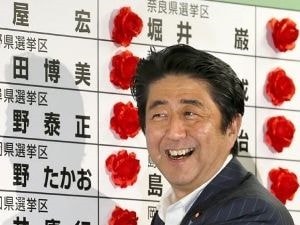Japan Election: Prime Minister Abe's Party Wins Big
Japanese Prime Minister Shinzo Abe's Liberal Democratic Party (LDP) won a resounding victory in the Upper House election on July 21 with 65 seats compared to the initial 34 seats, while the Democratic Party of Japan (DPJ), the current largest opposition party, suffered a heavy defeat with only 17 seats compared to 44 seats before the election.
Japanese Prime Minister Shinzo Abe's Liberal Democratic Party (LDP) won a resounding victory in the Upper House election on July 21 with 65 seats compared to the initial 34 seats, while the Democratic Party of Japan (DPJ), the current largest opposition party, suffered a heavy defeat with only 17 seats compared to 44 seats before the election.
According to the final results, the LDP and its coalition partner, the New Komeito Party (NKP), won 76 seats out of a total of 121. Thus, plus the 59 seats that did not have to be re-elected, the ruling coalition held 135 seats, ensuring a supermajority in the Upper House as previously set by LDP President, Prime Minister Abe.

The LDP's victory is expected to create conditions for the Japanese economy to escape deflation. (Photo: EPA)
Meanwhile, opposition parties won only 45 seats, dropping the total number of seats to 107 from 134 seats before the election.
In this election, the Japanese Communist Party (JCP) won 8 seats, the highest number of seats in the Upper House since 1998. The two main parties, People's Life First and the Blue Wind Party, returned empty-handed. Meanwhile, the Japan Restoration Party (SRP) won 6 more seats, bringing the total to 8 seats, and Your Party (YP) also won 5 more seats, bringing the total to 8 seats. In last place, the Social Democratic Party won only 1 seat, down 1 seat from before the election.
With the ruling coalition winning a supermajority in both the Upper and Lower Houses, the split in Japan's parliament has ended.
This will help Prime Minister Abe's administration to have more advantages when promoting a series of important decisions in the coming time, especially economic policies called Abenomics to help the Japanese economy escape the deflation that has lasted for nearly two decades./.
According to (Vietnam+) - DT






